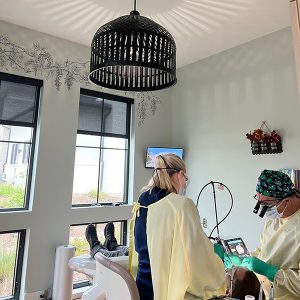Please note we may not offer this treatment at our office. Call (940) 566-4888 for more information.
A Minimally Invasive Way to Save Your Tooth
Root canal therapy is a standard treatment for saving teeth affected by severe decay or infection. However, traditional root canal treatment involves surgery, which can seem intimidating for many patients. Non-surgical root canal therapy provides a modern, minimally invasive alternative that is effective, comfortable, and efficient.
At our Denton, TX, dental office, we’re committed to offering options that prioritize your comfort. Keep reading to learn more about non-surgical root canal treatment and its benefits for preserving your natural tooth. If you have questions or want to schedule a consultation, call us at (940) 566-4888.
What Is Non-Surgical Root Canal Treatment?
Non-surgical root canal therapy treats infection within a tooth’s pulp and saves the tooth from extraction without surgical intervention. During this procedure, your dentist accesses the tooth’s pulp through the natural opening and uses specialized tools to clean and disinfect the root canals, fill them with a special material, and seal the tooth without making any incisions in the gum or jawbone.
Keys Benefits of Non-Surgical Root Canal Treatment
Non-surgical root canals offer several benefits over surgical root canal therapy, including:
- Painless Experience: With local anesthetic and advanced dental techniques, non-surgical root canals are virtually painless. Most patients report little to no discomfort during and after the procedure.
- Faster Recovery: Since no surgery is involved, patients can return to their regular activities almost immediately after treatment.
- Preserve Your Natural Tooth: Non-surgical root canals effectively eliminate infection while allowing you to keep your natural tooth for many more years.
- High Success Rate: This minimally invasive procedure has a high success rate in treating infected teeth, preventing the need for extraction.
Am I a Candidate for Non-Surgical Root Canal Treatment?
Non-surgical root canal therapy is typically recommended if your tooth decay or infection is caught before it advances too far. You may be a good candidate if you are experiencing:
- Severe Tooth Pain: Especially when chewing or applying pressure.
- Prolonged Sensitivity: Sensitivity to hot or cold that lingers after exposure may indicate pulp damage.
- Tooth Discoloration: A darkened tooth may signal a dying or infected pulp.
- Swollen or Tender Gums: Swelling around a tooth may suggest infection, potentially requiring root canal treatment.
- Dental Abscess: A pimple or bump on the gums can indicate an advanced infection needing immediate attention.
The Non-Surgical Root Canal Treatment Procedure
The non-surgical root canal procedure typically takes about one hour in a dental office. Here’s what to expect during the procedure:
- Local Anesthetic: The dentist will use a local anesthetic to numb the area around the affected tooth to ensure your comfort.
- Accessing the Pulp: They’ll use a special tool (usually a dental drill) to make a small hole in the top of the tooth to access the infected pulp.
- Removing the Infected Pulp: Your dentist will use small, flexible files to remove the infected pulp from the tooth and root canals.
- Cleaning the Root Canals: Once the infected pulp is removed, the dentist will clean the root canals using special tools. The root canals will be irrigated with a disinfectant solution to eliminate any remaining bacteria.
- Filling the Root Canals: Then, your dentist will fill the root canals with a special material, gutta-percha, to prevent further infection.
- Sealing the Tooth: Finally, the dentist will seal the tooth with a filling or crown to prevent bacteria from entering the tooth.
Non-Surgical Root Canal Treatment Aftercare
After treatment, patients can usually resume their normal activities immediately. However, it’s crucial to follow the dentist’s instructions for the care and maintenance of the treated tooth, which may include:
- Avoiding hard or crunchy foods for a few days after treatment
- Taking pain medication as prescribed by the dentist
- Practicing good oral hygiene, including brushing and flossing regularly
- Schedule a follow-up appointment with your dentist
Frequently Asked Questions
No, non-surgical root canals are performed under local anesthesia, so you won’t feel pain during the procedure. Some patients experience mild soreness afterward, but it is manageable with over-the-counter pain medication.
Most non-surgical root canal treatments can be completed in about one hour. The exact time will depend on the complexity of your case and the number of canals being treated.
Many dental insurance plans cover root canal treatments, including non-surgical options. However, coverage may vary depending on your specific plan. It’s best to check with your insurance provider for details.
Treat Infected Root Canals Without Surgery
Non-surgical root canal treatment is a viable alternative to traditional root canal treatment. It offers several benefits, including a quicker recovery time, less downtime, and a higher success rate.
Schedule a consultation with Drs. Ruehle and Eide by calling (940) 566-4888 to see if non-surgical root canal treatment is right for you. With proper aftercare, you can enjoy a healthy, pain-free smile for years to come. We proudly serve patients in Denton and surrounding areas, including Robson Ranch, Corinth, Argyle, and Krum, TX.




